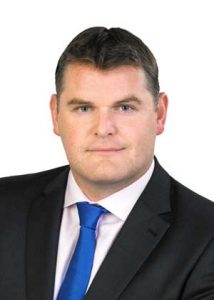Wealth Management for SME Owners
Congratulations! You have done the hard work and built a successful business. No doubt, it continues to occupy your thoughts constantly. Personal financial planning may be the furthest thing from your mind at present, but now may be the opportune time to reflect on your own financial position and to devise an appropriate wealth management strategy for you and for your family.
Michael Koreto’s definition of “wealth management” is a useful starting point: “Wealth management means taking care of the needs of affluent clients, their families and their businesses as part of a long-term, consultative relationship. It’s best conceptualised as a platform where a number of different sets of services and products are provided. It’s a full-service model that can offer advice on investment management, estate planning, retirement, tax, asset protection, cash flow, and debt management.” Successful wealth management encompasses all of the above. However, for the purposes of this article I intend to focus on diversification, tax efficiency and succession planning.
Diversification
One cannot overstate the importance of the need to diversify wealth in order to protect it. As Warren Buffett frequently points out, “you only have to get rich once.” Unfortunately, recent Irish history is littered with examples of wealth that was tied to the fortunes of a single enterprise and then devastated. By their very nature, SMEs are subject to more concentrated corporate, sectoral and geographical risk than their multinational counterparts are. Commerce 101 teaches us to stockpile both
ice cream and umbrellas, yet many SME owners eschew this basic principle of diversification. The savvier SME owner realises that the stock specific risk of his or her primary investment renders it a massive binary punt from a wealth management perspective. He or she therefore opts for a diversified investment strategy separate to his or her core investment in the SME.
Tax efficiency
Psychologically, many SME owners view corporate money as an extension of their own funds. However, as I am sure the Director of Corporate Enforcement would be keen to point out, this is not the case! The corporate veil that provides a degree of insulation from creditors also traps profits and gains at company level. So how can SME owners extract value from their businesses in a tax efficient manner? Well, in the first instance, dividends should generally be foregone in favour of additional salary or bonuses, on the basis that dividends are not deductible for corporation tax purposes, whereas salary and bonuses generally are.
Notwithstanding the restrictions that have been introduced over recent years in relation to the funding of pensions, the provision of a pension fund remains an attractive cash extraction option for an SME owner. A notional fund limit of €2m now exists (in practice the limit is €2.15m), which is not insignificant, but is certainly a long way from the halcyon days when it was possible to build a pension fund of unlimited size. However, significantly, an SME owner should generally have scope to involve his or her spouse in the business, thus doubling the couple’s pension fund threshold to a more attractive €4m / €4.3m. As an aside, at or in advance of retirement, individuals with significant pension assets and the scope to leave Ireland are increasingly migrating to sunnier climes such as Portugal where pension payments may, in certain circumstances, be tax exempt. More attractive than our current marginal rate of 48% for individuals aged 66 and over I am sure you would agree!

Owners of what are known as “closely held companies” for tax purposes are no doubt familiar with the issue of close company surcharge. At a high level, it provides for a surcharge at an effective rate of 14% on any passive income (e.g. deposit interest, rental income, etc.) that is earned by a company controlled by five or fewer individuals and
not distributed to the company’s shareholders. Given the current and sustained ultra-low interest rate environment, such corporates are earning a paltry or even negative return on their deposits and suffering corporation tax at the higher rate (25%) plus the close company surcharge. Against this backdrop, many SMEs are using life policies as a platform to seek a more palatable rate of return and as a way to avoid the close company surcharge, thus preserving and enhancing corporate wealth, and by implication the SME owner’s total wealth.
Succession planning
Jurisdictions such as the UK and the US are more evolved than our own in the context of intergenerational wealth transfer and succession planning. This is simply a function of their greater history of wealth creation. However, given the age profile of Ireland’s wealth creators, efficient succession planning is moving to the forefront of many SME owners’ minds.
An SME owner may consider himself or herself unlikely to retire or step-back in the short to medium term. However, in the context of devising an effective succession plan, it is best to start with time on one’s side, especially in relation to the various tax reliefs that are currently available.
The two most relevant tax reliefs are retirement relief from Capital Gains Tax (“CGT”) and business property relief from Capital Acquisitions Tax (“CAT”). The applicable tax rates increased from 20% to 33% during the economic crisis. For a disposal of shares in a trading company to the SME owner’s child (or to his or her niece or nephew in certain circumstances), it is possible for the SME owner’s CGT liability (regardless of size) to be reduced to zero by way of retirement relief. With regard to the beneficiary, business property relief can reduce his or her corresponding CAT liability in respect of the gift (or inheritance) by 90% (again regardless of size).
The potential value and importance of these reliefs is therefore obvious for an SME owner. However, a number of conditions must be satisfied in order for the reliefs to be available, many of which require significant advance planning. It is therefore vital that the SME owner considers his or her succession plan not when he or she is heading for the exit door, but years in advance of that fateful day. As a final aside, an SME owner planning his or her exit could also do a lot worse than appoint
two strong independent non-executive directors to the board of his or her company. This can go a long way to avoiding and mitigating the risks that arise when the generation that has created a business hands over its reins to the next generation.
Conclusion
The definition of wealth management that I quoted at the outset refers to “taking care of the needs of affluent clients.” It is probably an Irish characteristic that many people who are definitively “affluent” in terms of their asset base do not necessarily see themselves as such. The broadening of the post-retirement Approved Retirement Fund (“ARF”) market has created a significant degree of democratisation in the context of wealth management; by way of example, it is worth highlighting that an individual with an annual salary of circa €50k, and whose pension fund receives a typical level of employee and employer contributions, should end up with a substantial ARF. Put simply, an ARF is a post-retirement pension fund and an alternative to traditional defined benefit pensions or annuities. It has many attractive characteristics, but these can be moot if the individual does not receive high-quality investment and financial planning advice from a well-resourced wealth manager.
Investec Wealth & Investment
At Investec Wealth & Investment, our job, in simple terms, is to make a client’s life easier and his or her family balance sheet stronger through the delivery of robust and high-quality investment and financial planning solutions. We have specialist investment and financial planning specialists and our approach is to ensure that a client is set-up in the right way from a structural perspective before considering his or her investment needs. Then we leverage our global investment resource to populate our clients’ portfolios with what our team believe to be best-of-breed investments. The analogy that we frequently use, and which seems particularly apt on these pages, is that “we build the house first.” Our charging structure is transparent and, somewhat unusually in Ireland, we receive no remuneration from any underlying investment providers. Given the relative complexity of the investment and financial planning landscape, our combination of local specialist presence and global investment resource is one that continues to resonate with clients. This article is meant for illustrative purposes only. For detailed information and advice please contact Investec.
Andrew Fahy is Head of Tax & Financial Planning at Investec Wealth & Investment. He is a Chartered Accountant, a Chartered Tax Adviser and a Qualified Financial Adviser. Andrew assists clients with tax, retirement and financial planning. Andrew’s role has a particular emphasis on tax-efficient structuring of investments, retirement, and succession planning. He also serves as a lecturer and examiner for the Irish Tax Institute.
Follow Irish building magazine on Twitter, LinkedIn and Instagram for industry news and views.


